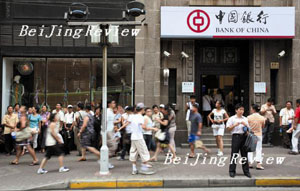
Ms. Wang, a financial planner at one of China's largest state-owned banks, takes five phone inquiries a day from clients about its new QDII products, with most clients saying they will consider it.
"I have an enquiry about your bank's QDII products. What are the returns? What are the risks?" are the typical call of this nature, she said. "A lot of people show great interest at the beginning, but few order them."
The long anticipated QDII products were first launched by the Bank of China (BOC) on July 28. The product is a kind of fund launched by approved banks, fund management companies and insurers, called Qualified Domestic Institutional Investors (QDII), to invest in overseas capital markets on behalf of their clients. QDII would convert renminbi (RMB) into foreign currency and invest in overseas bills and money market instruments with high investment grade ratings.
QDII is considered as a scheme, allowing limited domestic investors to invest in overseas securities markets, which earlier they were unable to do because of limitations on RMB convertibility under China's capital account.
After BOC's product launch, the Industrial and Commercial Bank of China (ICBC), the country's largest lender, also launched its fund, allowing residents in Beijing, Shanghai, Shenzhen, Guangdong, Zhejiang and Jiangsu to purchase its QDII products. Later in August, the Bank of Communications (BOCOM), HSBC and the Bank of East Asia came out with similar products.
But despite intense promotion, the launch of QDII products in China has not received the investor appeal that was hoped.
Less competitive
On August 9, when the period to subscribe for ICBC's first QDII products expired, the subscription amount was less than 1 billion yuan—just half that expected. Some of the bank's cashiers were reportedly unclear about exactly what a QDII product is, and returns are not as certain as more traditional dollar- and yuan-denominated investments in the Chinese market.
Some wealth management professionals believe that when a 3 percent exchange loss is taken into consideration, returns of QDII products may fall in value or even lose money.
However, ICBC's QDII products promise returns of 3-7 percent. But on the lower end of that range, if it's 3 percent, there will be little earnings left after deducting management fees and costs and taking RMB appreciation against the U.S. dollar into account.
Even though BOCOM's QDII products are expected to offer returns of up to 12 percent, some wealth management professionals advise investors to compare it to other RMB wealth management products and take exchange rate risks into consideration.
Most banks' RMB fixed-income products offer returns of around 3-4 percent, with no exchange rate risk attached. A QDII product with a one-year maturity of less than 6 percent in return would not be competitive. With returns on the money market around 2 percent at present and taking exchange rate risk into account, only a QDII product offering a return greater than 5 percent will be attractive to investors. Whether BOCOM's QDII products will be as profitable as anticipated is yet to be seen, as some experts predict they will return just 2 percent.
Some experts say the banks have made their products too complicated and that few investors can understand them.
QDII products are still at the initial stage of development in China and there is a long way to go before they are fully understood by the market.
Portfolios preferred
Even so, QDII products, as a new investment channel, are still attractive for investors to spread their investment risk around.
BOC's products are similar to open-ended funds in that they invest in products on overseas money markets and short- and medium-term bonds to maintain high liquidity of their assets, with no definite expectation of returns. Investors can purchase or redeem them at any time and, as a result, QDII products provide greater liquidity than foreign exchange and RMB wealth management products.
Additionally, to meet the needs of investors with different preferences, ICBC and BOCOM produce both exchange rate risk avoidable and non-avoidable products, allowing clients to choose which they prefer. If clients' expectation of RMB appreciation is much, they may prefer to choose exchange rate risk avoidable products. Otherwise, non-avoidable products will be chosen.
Some experts believe the returns of QDII products could be lower than expected if RMB appreciates too fast or interest rates hike in the second half of this year.
Given that most advisors say investors are wise to allocate capital across a range of investment options to avoid risks, QDII products may have a place in a diversified portfolio, along with fixed-income deposits, treasury bonds and domestic RMB wealth management products.
(Xinhua Finance)
DISCLAIMER: The information contained herein is based on sources we believe to be reliable, is provided for informational purposes only, and no representation is made that is accurate or complete. This briefing should not be construed as legal, tax, investment, financial or other advice, and is not a recommendation, offer or solicitation to buy or sell any securities whatsoever.
| 